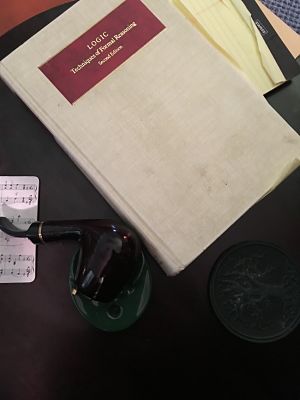
Formal logic is a fierce guide to validity. Move an argument from prose and analyze it and you will often discover better rhetoric than logic.
Most students (though not here!) are only taught “informal” or baby logic. The day an informal fallacy is taught to a student in junior high is the day they gain a super power, but with great power (I am told) comes great responsibility. Rushing home and telling your Mother she has engaged in a false appeal to authority is not just unwise, imprudent, but usually an incorrect application of the rules.
Recall that most of what you see in media regarding logic is informal logic: this does not mean that logic is wearing jeans to the Met, but that these are good general rules for public discourse. Rigor is much less. In fact, one popular “fallacy” is not (strictly speaking) fallacious reasoning at all.
The next time you hear someone say: “that argument is circular” . . . think a moment:
Premise: P
Therefore: P.
This is circular, but it is not invalid. In fact, it is an important truth of reason: if a thing is true, then the thing is true. The advice to a student about circular reasoning is pretty good advice, because sometimes people try to sell you things based on a conclusion hidden in their premises. After all, if you knew this affordable car was “the car you must buy” don’t you already know “you must buy it?” The warning (and it is a good one) of the informal circular reasoning fallacy is that you should not be persuaded by the argument . . . in fact, you don’t need the argument.
If you know the dubious premise is true, then the argument is true.
This matters, because a great many big systems to explain reality (including some in science and religion) are circular. Each truth of the system supports every other truth. Outside the system itself you can question the truth of some of the premises, but the problem with the “big system” is not that it is circular. It has to be circular. The problem with a big system like this (say philosophical materialism) is that the arguments are not persuasive or the premises are false.
The problem is the misuse of logic in daily life. Logic ought to be the bare minimum of a discussion. If your argument isn’t valid, you are not worth any thinking person’s attention. The good stuff should come in examining the truth of your claims or the persuasiveness of your claims.
Materialists can make valid arguments against God:
Premise: Everything that exists is made is matter and energy.
Premise 2: God is not made of matter and energy.
Conclusion: God does not exist.
This argument is “logical” (valid), but it is not very persuasive, because the first premise is dubious. Mathematical objects and ideas both exist (or arguably exist) and so there is no reason for even an atheist simply to buy the truth of the first premise.
Logic doesn’t tell you what is true or even what will persuade. You can make a valid argument with false premises. A valid argument is (roughly) one where the premises cannot be true and the conclusion false. A man can make valid arguments all day (the conclusion “follows” from the premises) using false ideas that generate all kinds of conclusions. Some of the conclusions will be true and some false.
For example:
Premise: The moon is made of green cheese.
Premise 2: If the moon is made of green cheese, then the Broncos will win on opening night 2016.
Conclusion: The Broncos will win on opening night in 2016.
This is a valid argument. If the premises are true, then the conclusion must also be true. Notice that (in fact!) the conclusion turned out to be true. Yet this valid argument will not end up persuading anyone in my prophetic skill for two reasons:
First, I wrote it after the event.
Second, the moon is not made of green cheese. By the way, the truth value of counter-factual statements like Premise 2 is . . . difficult. Let’s leave that for another day.
Other informal fallacies are also decent advice as far as they go, but sometimes fail for a different reason. It is quite true that a valid argument is still valid, even if Mao says it, but if Mao made an argument, I would be very dubious about the truth of the premises.
You should not attack the validity of an argument based on the source, but it is not unreasonable to worry about truth claims if the person has proven (in your experience) a monumental liar in the main.
In this case, a fallacy (genetic or some uses of ad hominem) is often misused by the junior high student gunning for errors in his elders. We cannot dismiss an argument’s validity just because Mao made it, but given Mao’s moral status as a monster, I shan’t be wasting time reading Mao for moral arguments. It really does matter when a politician lies a great deal. . .
Don’t blame the informal fallacy for this mistake we make . . . blame all of us forgetting that validity and truth are not the same concepts. I hear “that’s valid” for “that’s true” all the time, harmless enough until fallacy calling out arises. Saying James G. Blaine’s statements are not to be trusted, because he is ” a continental liar from the state of Maine” is not ad hominem. The critic isn’t questioning the validity of Blaine’s arguments based on Blaine’s bad character, but whether we can trust his account of anything we cannot prove from secondary sources.
Blaine may be Mr. Validity, but if he is Mr. Liar, then he shouldn’t persuade us with his arguments.
As for the junior high student, Mom is a relevant authority for determining when snacks are eaten. In normal cases, her denial of snacks, because of her (even arbitrary!) sense of when snacks should be distributed is enough, because they are her snacks. Don’t confuse a false appeal to authority with a useful one. None of us can know everything and so pointing to a medical doctor as an authority: “because Dr. Cho said no” is not informally invalid.
A good Mom is a very expert authority on snacks and snack consumption.
Or so it is wise for you to believe!












